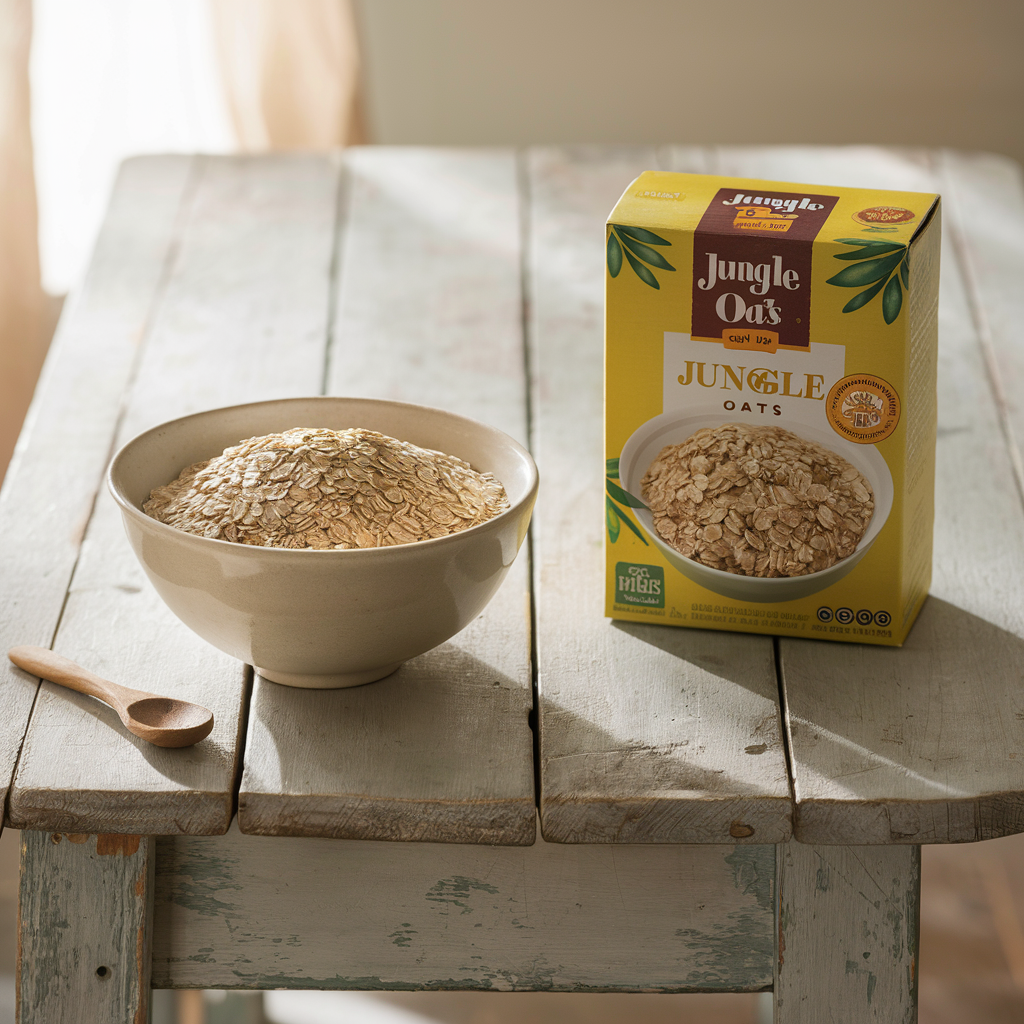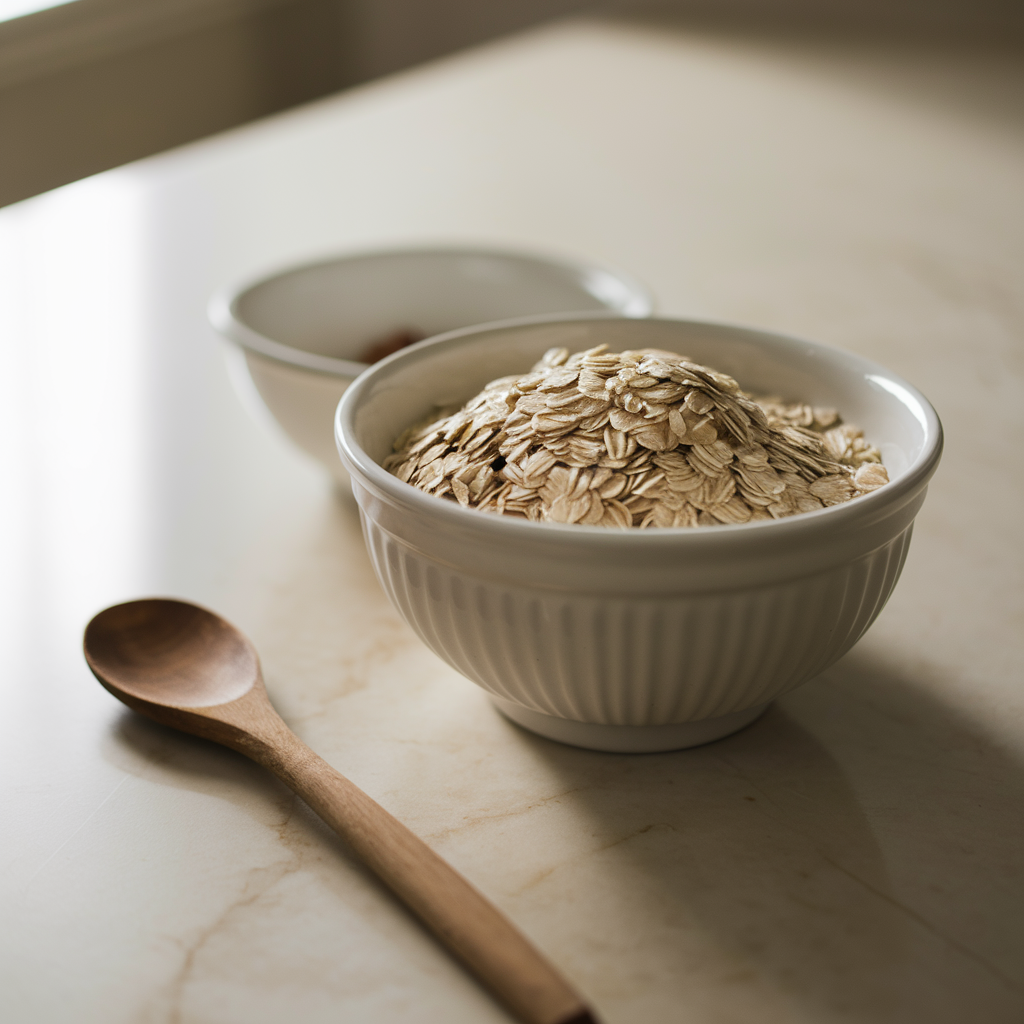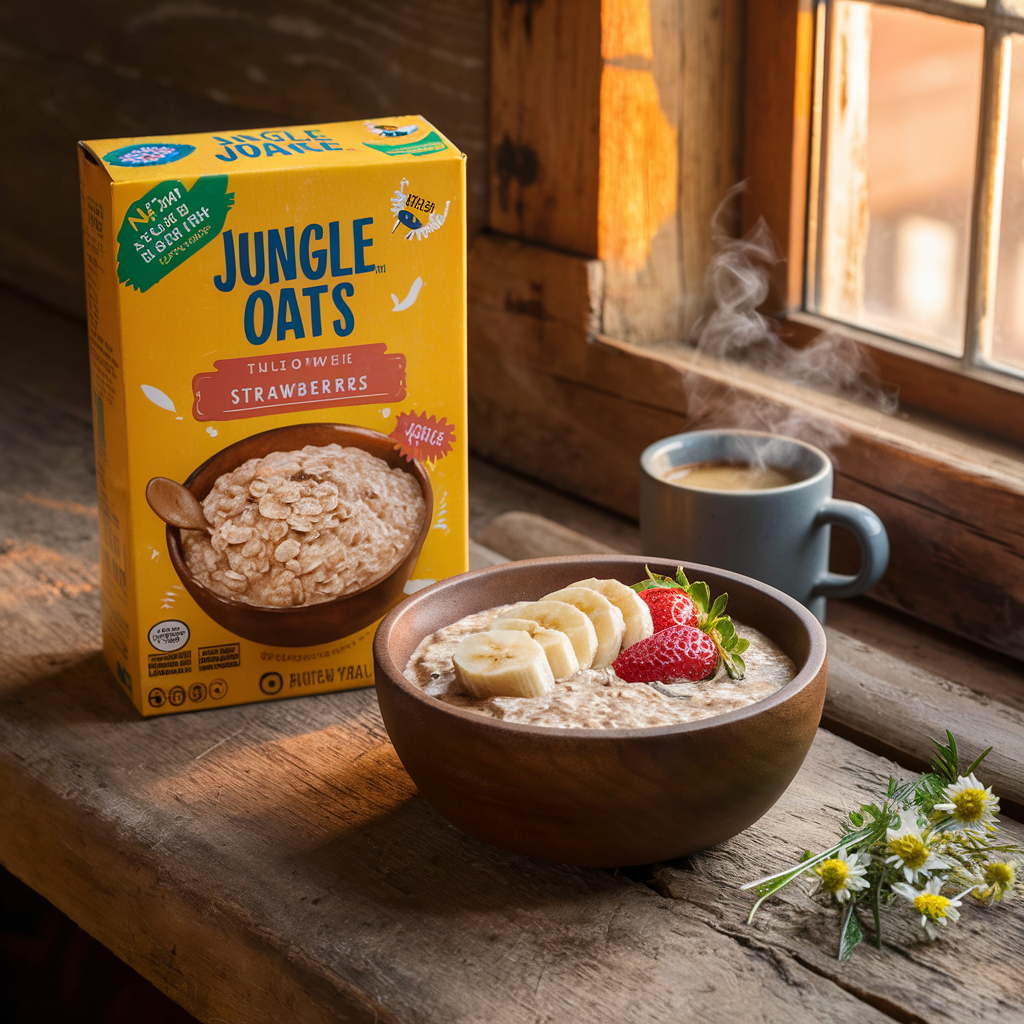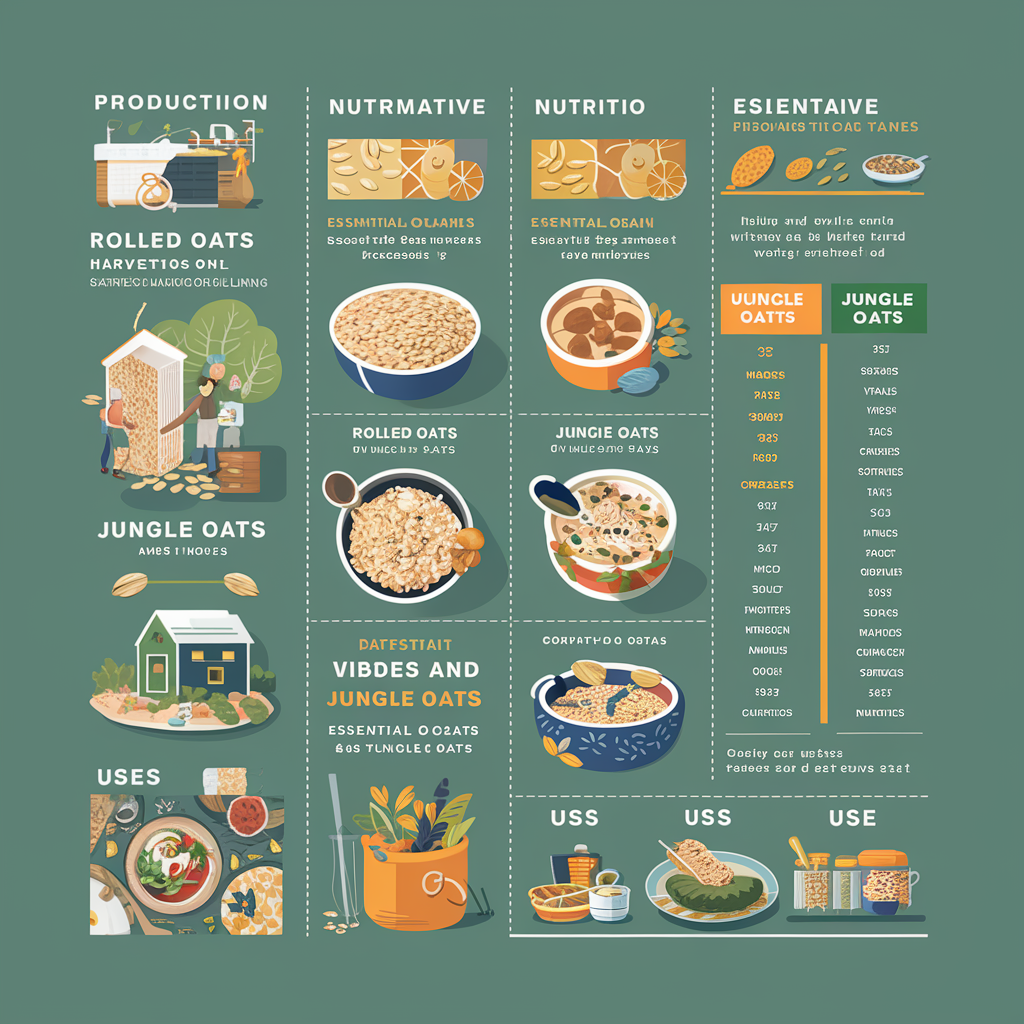
Oats rank among the most popular breakfast options because they provide excellent nutrition, adapt to many recipes, and take little time to prepare. However, many people feel unsure about the differences between rolled oats and Jungle Oats. Are they the same, or does each have unique features?
This article explores how rolled oats and Jungle Oats differ in production, nutrition, and uses. By the end, you’ll clearly understand which one fits your preferences and lifestyle. Let’s start by examining each type of oat.
Table of Contents
Understanding Rolled Oats

What Are Rolled Oats?
Rolled oats are a classic choice for anyone seeking a nutritious and versatile grain. Producers make rolled oats by first steaming whole oat groats (the dehulled grain) and then flattening them with large rollers. This process softens the oats, which makes them quicker to cook than their steel-cut counterparts. As a result, you get flat, oval-shaped flakes with a mild, nutty flavor.
Moreover, rolled oats retain their bran and germ layers, which are rich in nutrients. This quality makes them a popular choice for health-conscious eaters. Because of their neutral taste and quick preparation time, they work well in many recipes, from breakfast bowls to baked goods.
Health Benefits of Rolled Oats
Rolled oats offer numerous health benefits, which make them a powerful addition to any diet. Here are some of the top advantages:
- Rich in Fiber: Rolled oats contain soluble fiber, particularly beta-glucan, which helps lower cholesterol levels and improves heart health over time.
- Nutrient-Dense: They are an excellent source of essential vitamins and minerals like manganese, phosphorus, magnesium, and B vitamins. Consequently, they support overall well-being.
- Supports Digestion: The fiber in rolled oats promotes regular bowel movements and supports a healthy gut microbiome.
- Energy-Boosting Carbohydrates: Rolled oats provide a steady release of energy, which makes them perfect for breakfast or pre-workout meals.
- Weight Management: They promote satiety and help control hunger, which can support weight loss goals when paired with a balanced diet.
How to Use Rolled Oats
Rolled oats are incredibly versatile and feature in countless recipes. Here are a few popular ways to use them:
- Classic Oatmeal: Cook rolled oats with milk or water. Then, add toppings like fresh fruit, nuts, and honey for a hearty breakfast.
- Baking: Use them in cookies, muffins, granola bars, and bread to add texture and nutrients.
- Smoothies: Blend them into smoothies to boost the fiber content and make your drink more filling.
- Savory Dishes: Incorporate rolled oats into meatloaf, veggie patties, or as a thickener for soups and stews.
In short, their easy preparation and adaptability make rolled oats a staple in kitchens worldwide.
Exploring Jungle Oats

What Are Jungle Oats?
Jungle Oats, a well-known oat product in South Africa, is a specific brand that has become a household name. Unlike generic rolled oats, Jungle Oats markets itself as a premium choice for health-focused individuals. The company uses whole oat groats to create a product that closely resembles rolled oats in appearance and function. However, its branding and packaging emphasize convenience and tradition.
Furthermore, Jungle Oats sets itself apart by promoting its heritage as a trusted source of nutrition since its launch in 1920. While Jungle Oats are essentially rolled oats, the brand’s unique identity and loyal customer base distinguish it from standard oats available on store shelves.
Health Benefits of Jungle Oats
Jungle Oats share many of the same health benefits as rolled oats since they are made from the same base ingredient: whole oat groats. However, the brand’s focus on quality and consistency may appeal to some consumers. Here’s how Jungle Oats can enhance your health:
- Heart Health: Jungle Oats are rich in soluble fiber, particularly beta-glucan, which helps lower bad cholesterol levels and reduces the risk of heart disease.
- Sustained Energy: The slow-digesting carbohydrates in Jungle Oats provide steady energy, making them ideal for active individuals.
- Rich in Nutrients: Just like rolled oats, Jungle Oats offer a wealth of nutrients, including magnesium, phosphorus, and B vitamins, which support overall health.
- Weight Control: The high fiber content helps you stay full longer, which can curb overeating and aid in weight management.
- Gluten-Friendly: While oats are naturally gluten-free, Jungle Oats are processed with care to minimize cross-contamination. However, individuals with celiac disease should always check the packaging for certification.
Popular Recipes Using Jungle Oats
Jungle Oats shine in recipes where convenience and consistency matter. Here are some delicious and practical ways to use them:
- Traditional Oatmeal: Prepare Jungle Oats with water or milk, then sweeten with sugar or honey. Add toppings like banana slices, raisins, or a sprinkle of cinnamon for a wholesome breakfast.
- Breakfast Bars: Combine Jungle Oats with peanut butter, honey, and dried fruit to create no-bake energy bars that are perfect for on-the-go snacking.
- South African Rusks: Jungle Oats are a key ingredient in this beloved South African treat. Bake rusks with oats, flour, and buttermilk for a crunchy snack.
- Oat Smoothie Bowl: Blend Jungle Oats with yogurt and fruit for a thick, creamy smoothie base. Top with granola and seeds for added texture.
- Savory Oat Porridge: Add Jungle Oats to vegetable stock, then mix in sautéed vegetables and herbs for a warm and filling dish.
Jungle Oats not only deliver on nutrition but also offer the consistency and reliability of a trusted brand, making them a staple in many households.
Key Differences Between Rolled Oats and Jungle Oats

Understanding the differences between rolled oats and Jungle Oats can help you make informed decisions about which type is best for your needs. Although both products share similarities as they come from the same grain, several factors set them apart.
Production Methods
Rolled oats and Jungle Oats start as oat groats, but their processing methods differ slightly. Producers create rolled oats by steaming the groats and flattening them with rollers. This process gives rolled oats their thin, oval shape and makes them easy to cook.
On the other hand, Jungle Oats are also steamed and rolled, but they undergo strict quality checks under the brand’s guidelines to ensure consistency. Jungle Oats markets itself as a premium brand, emphasizing its rich history and reliability. While the differences in production may seem minor, some consumers prefer the branded assurance Jungle Oats offers.
Nutritional Value Comparison
In terms of nutrition, both rolled oats and Jungle Oats are nutrient-dense and provide similar health benefits. However, slight variations exist depending on the brand’s recipe.
- Calories and Macronutrients: Both rolled oats and Jungle Oats deliver roughly 150 calories per half-cup serving, along with 5 grams of protein, 27 grams of carbohydrates, and 2.5 grams of fat.
- Fiber Content: Both options are rich in soluble fiber, particularly beta-glucan, which supports heart health and digestion.
- Added Ingredients: While pure rolled oats are often unprocessed, some Jungle Oats varieties may contain added ingredients such as flavoring, which slightly alters their nutritional profile. Consumers seeking 100% pure oats should always read the labels carefully.
Taste and Texture
The texture of rolled oats is slightly softer and creamier when cooked, which makes them versatile for recipes like overnight oats and baked goods. Jungle Oats, on the other hand, often have a firmer bite and a more robust flavor. Some users describe Jungle Oats as having a nuttier taste, which adds depth to traditional oatmeal dishes.
For those who prioritize taste, this distinction may influence their choice. Rolled oats work better for people who enjoy a softer consistency, while Jungle Oats appeal to individuals seeking a heartier texture.
Packaging and Branding
One of the most notable differences lies in branding. Rolled oats are a generic term and are available from various manufacturers, often sold in bulk or under private labels. In contrast, Jungle Oats is a specific brand that offers a consistent product marketed as premium quality.
Jungle Oats distinguishes itself with colorful packaging and an established reputation in South Africa. Its branding often highlights tradition and trust, which appeals to long-time users. Rolled oats, however, come in diverse packaging and from multiple sources, offering greater variety but less branding consistency.
Versatility in Recipes
While both rolled oats and Jungle Oats can be used in many dishes, their slight differences in texture and taste make them better suited to certain recipes.
- Rolled oats work exceptionally well in recipes requiring a soft or creamy texture, such as overnight oats, porridge, and baked goods.
- Jungle Oats: Shine in hearty recipes like breakfast bars, rusks, and traditional hot oatmeal where a firm texture is desirable.
Ultimately, their versatility ensures both options remain staples in many kitchens.
Which Should You Choose?
When deciding between rolled oats and Jungle Oats, your choice will largely depend on your dietary needs, taste preferences, and lifestyle. While both options offer exceptional health benefits and versatility, certain factors can help you determine the best fit for your pantry.
Rolled Oats for Versatility
Rolling oats are a highly customizable ingredient. Their mild flavor and soft texture make them an excellent base for various dishes, from creamy porridges to baked goods. Rolled oats are widely available in supermarkets and health food stores, often at a lower cost than branded options like Jungle Oats.
Rolled oats are also ideal for those who enjoy experimenting in the kitchen. Whether you’re making granola, cookies, or thickening a savory soup, rolled oats provide endless possibilities.
Who Should Choose Rolled Oats?
- People who love cooking and exploring recipes.
- Budget-conscious shoppers looking for affordable options.
- Individuals who want oats with minimal or no processing.
Jungle Oats for Simplicity
Jungle Oats, as a trusted brand, appeals to consumers seeking quality and consistency. The brand offers a nostalgic connection for many families and a product that delivers every time. Its slightly firmer texture and nuttier flavor enhance traditional oatmeal recipes, making it a go-to for those who prioritize flavor.
Additionally, Jungle Oats packaging often includes preparation instructions and serving suggestions, which are helpful for those new to incorporating oats into their meals. Jungle Oats are also popular among busy individuals who value convenience and trust the brand’s heritage.
Who Should Choose Jungle Oats?
- Those who prefer a trusted, consistent brand.
- Individuals looking for a heartier texture and richer flavor.
- Consumers who value the cultural connection and nostalgia associated with the brand.
Comparing Costs and Availability
Price can also influence your decision. Generic rolled oats are often cheaper, particularly when purchased in bulk. In contrast, Jungle Oats may cost more due to its branding and perceived premium quality. However, some consumers find the assurance that comes with a branded product to be worth the additional cost.
When it comes to availability, rolled oats have a slight edge since they are sold in a variety of stores globally. Jungle Oats, though widely popular in South Africa, may be harder to find in other regions, which could limit accessibility for international shoppers.
Making Your Choice
Both rolled oats and Jungle Oats are excellent options that deliver health benefits and versatility. If you’re after a simple, cost-effective ingredient with endless culinary potential, rolled oats are the right pick. On the other hand, if you prefer a branded product with a richer taste and firmer texture, Jungle Oats could be your ideal choice.
Frequently Asked Questions (FAQs)
Can You Substitute Jungle Oats for Rolled Oats?
Yes, you can substitute Jungle Oats for rolled oats in most recipes. Since both are made from whole oat groats and share similar properties, they work interchangeably in many dishes. However, Jungle Oats may have a slightly firmer texture and nuttier flavor, which could alter the final result somewhat. For recipes that require softer oats, like overnight oats, soaking Jungle Oats a bit longer may help.
Are Jungle Oats Healthier Than Rolled Oats?
Nutritionally, Jungle Oats and rolled oats are nearly identical since they are both made from whole oat groats. Both contain high levels of fiber, protein, and essential vitamins and minerals. However, Jungle Oats, being a branded product, may occasionally include fortified nutrients or added ingredients depending on the variety. Always check the label to ensure you’re choosing the option that aligns with your health goals.
Are Jungle Oats Gluten-Free?
Oats, in their natural state, are gluten-free. However, cross-contamination during processing can occur, especially if oats are processed in facilities that handle wheat or barley. Jungle Oats and most rolled oats are not certified gluten-free unless specified on the packaging. If you have celiac disease or gluten sensitivity, look for oats labeled as gluten-free to be safe.
Which Is Better for Weight Loss?
Both Jungle Oats and rolled oats are excellent for weight loss, thanks to their high fiber content. Fiber keeps you feeling full for longer, which can reduce overeating. Rolled oats might have a slight advantage due to their versatility and availability, making them easier to incorporate into various weight-loss-friendly recipes. However, Jungle Oats’ robust flavor and texture might encourage better meal satisfaction for some people.
How Should Oats Be Stored?
Store both rolled oats and Jungle Oats in an airtight container in a cool, dry place to maintain freshness. If you purchase oats in bulk, transfer them to a sealed container to protect them from moisture, pests, and odors. For long-term storage, keeping oats in the refrigerator or freezer can extend their shelf life without affecting their quality.
Conclusion
Rolled oats and Jungle Oats share many similarities, but each has unique qualities that make them appealing to different types of consumers. Rolled oats offer incredible versatility and affordability, making them a staple for creative cooks and those on a budget. On the other hand, Jungle Oats, with its strong branding and firmer texture, appeals to individuals seeking a premium product and a consistent taste experience.
By understanding the differences in production, nutrition, taste, and uses, you can confidently choose the option that suits your lifestyle and dietary preferences. Whether you lean toward the simplicity of rolled oats or the tradition and flavor of Jungle Oats, both provide a nutritious start to your day.

1 thought on “What is the Difference Between Rolled Oats and Jungle Oats?”